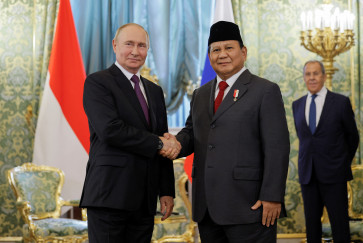Popular Reads
Top Results
Can't find what you're looking for?
View all search resultsPopular Reads
Top Results
Can't find what you're looking for?
View all search resultsHow tax reform can help advance gender equality
Indonesia’s female population (49
Change text size
Gift Premium Articles
to Anyone

I
ndonesia’s female population (49.8 percent of the total population) is expected to reach 132.8 million in 2019, on par with the total population of Mexico (132 million) or Japan (126 million). Statistics Indonesia (BPS) even projected that the female population would exceed the male population with a proportion of 50.22 percent in 2045. This is an opportunity for Indonesia to level up its economic performance, as greater female representation in the labor force will boost gross domestic product (GDP).
Advancing gender equality and increasing women’s participation in the labor force will have an impact on boosting the country’s economy. According to the McKinsey research firm, advancing gender equality in Indonesia would add US$135 billion to annual GDP by 2025. However, the huge potential of women’s participation in the economy is still uncaptured because structural gender inequality continues to exist.
Gender inequality in Indonesia is reflected through women’s level of participation in the labor force and their wages, which are always much lower men’s. Last August the labor force participation rate for men and women was recorded at 82.69 percent and 51.88 percent, respectively. The low labor force participation rate for women has been stagnant for over the past 20 years.
This inequality is also widened by the wage difference between male and female workers. Male workers’ wages are always higher than women’s in every level of completed education. Among university-educated workers, there is a Rp 1.63 million ($112) gap between the male and female workers’ wages. The Indonesian Women’s Human Development Index (HDI) also shows a vast gap compared to the Male HDI.
The government state budget stipulates a commitment to reducing gender inequality through budget policies and allocations. Based on the 2019 state budget, expenditures for gender equality programs have increased by 102.3 percent in the last five years. Since 2015, gender equality spending through the Women’s Empowerment and Child Protection Ministry grew from Rp 60.6 billion to Rp 122.6 billion in 2019. However, these efforts were not fast enough to combat gender inequality.
Thus, these budget allocation and budget policies should be combined with taxation reforms in order to advance gender equality. Although ongoing taxation reforms show some positive changes, they are not enough to address the country’s many social issues.
The issue that often escapes the attention of policymakers is the taxation perspective for gender equality. To date, tax policy reforms still pay very little attention to the impact of tax policies on gender equality. In fact, the taxation system still discriminates on the basis of sex.
For example, the Income Tax Law adheres to the family unit (joint filing) principle as an economic unit, with men as the head of the family. The problem arises when a wife, as an employee and with her own Tax Identification Number (NPWP), wants to settle her own tax liabilities. The Income Tax Law regulates that married women who have their own NPWP and want to settle out their tax liabilities are treated separately from the progressive rate principle.
This means the net income of working women is combined with the husband’s income, and each of them bears the proportional tax burden. The injustice of tax policies toward working women happens because the employer already withholds the income tax on the employed wife who has her own NPWP. Due to the progressive rate of income taxes, the working wife (as an employee) who has her own NPWP suffers a higher tax burden.
The government should consider fully applying the individual tax filing (separate taxation) principle as it is considered to be more gender-equitable than the joint or family taxation principle. Separate taxation means that men and women are taxed on their income alone. This can be seen as a step toward gender equality in employment and separate taxation also improves women’s bargaining power within their household.
Another policy that can help advance gender equality is the child incentive policy, such as the Working Families Tax Credits in the United Kingdom, which enables more women to participate in the labor force. This Tax Credits makes the UK tax system highly distributed toward low-income working families with children. A 2017 World Bank research also recommends Indonesia to develop policies that facilitate access to childcare since it has the potential to increase women’s labor force participation.
In essence, working married women are sacrificing many things for their children and family. However, the wages they receive to support their family are eroded by the discriminatory tax system.
In this way, the current taxation system discourages the woman as breadwinner or second earner from participating in the labor force. The Income Tax Law and its derivative regulations need to be harmonized with the spirit of gender equality.
The essence of taxation policies is not only limited as a budgeting function to collect revenue but also as a regulating function that has a significant influence to achieve the national goal.
Family care is a vital part of the economy. Insufficient time and resources dedicated to family care could adversely affect productivity and cause unsustainable economic growth. A childcare incentive policy is also essential to improve women’s involvement in the labor force and create sustainable growth.
_______________________
The writer is an analyst at the Finance Ministry’s Center of Financial Sector Policy and Fiscal Policy Agency. The views expressed are his own.









